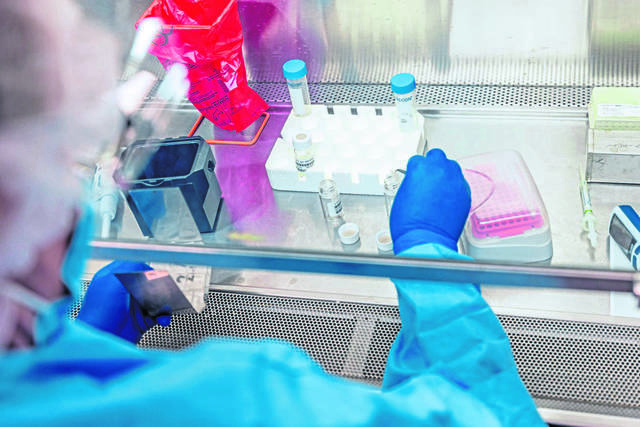https://development.triblive.com/opinion/drs-terence-s-dermody-mark-gladwin-thanks-to-pittsburgh-for-leadership-in-covid-19-crisis/
Drs. Terence S. Dermody & Mark Gladwin: Thanks to Pittsburgh for leadership in covid-19 crisis

Terence S. Dermody, M.D., is the Vira I. Heinz Distinguished Professor and chair of the Department of Pediatrics at the University of Pittsburgh School of Medicine, and physician-in-chief and scientific director at UPMC Children’s Hospital of Pittsburgh. Mark Gladwin, M.D., is the Jack D. Myers Distinguished Professor and chair of the Department of Medicine at the University of Pittsburgh School of Medicine and UPMC.
We write as chairs of large clinical departments at UPMC to express our pride and gratitude to our health care workers, institutional and civic leaders, and the citizens of Pittsburgh for guiding and supporting us during these early months of the covid-19 pandemic. New cases are trending down in Allegheny County, which makes us think that we are succeeding in limiting the covid-19 surge in Western Pennsylvania.
Pittsburgh did not get hit as hard with covid-19 as other large cities. Our population density is less than that of the hot-zone cities in the United States and elsewhere, and we are not an international gateway, which may have helped. But we think that the exemplary leadership and strong commitment to physical distancing — a term we prefer to social distancing — during this crisis allowed us to flatten the curve and prevented illness in many Pittsburghers.
While it is too early to declare victory, we want to share our gratitude for the courage, organization, innovation and common purpose that we have witnessed over these last two months.
We thank Allegheny County Executive Rich Fitzgerald, Pittsburgh Mayor Bill Peduto and Allegheny County Health Department Director Dr. Deborah Bogen for moving fast to implement the physical distancing guidelines that limited transmission of the virus. We are grateful to the leaders of the UPMC Covid-19 Command Center who worked with teams in the thousands to coordinate inpatient and outpatient care, procurement and use of personal protective equipment, expansion of viral testing, and infection prevention and treatment protocols. We thank our many clinical operational leaders who worked with our hospital presidents across the state to develop specialized covid-19 care units in all of our hospitals.
We also are proud of the innovation and collaboration between the University of Pittsburgh and UPMC.
Our faculty developed an in-house polymerase chain reaction test for SARS-CoV-2, which allowed us to rapidly test more than 500 patients a day and move infected patients into safe treatment units in the hospital. This testing has supported UPMC hospitals across Pennsylvania and even assisted our Veterans Affairs Hospital.
Rapid innovations in health care information technology allowed us to establish new ways to see patients quickly and safely in their homes with video visits and email consultations. Remarkably, we are now seeing almost 70% of our patients using these new telemedicine technologies.
Concerns for stressed health care systems led to the development of a scarce resources allocation policy for UPMC that was adopted by the state and is becoming policy for the nation.
Finally, teams of clinical investigators have implemented an adaptive clinical trials system across all UPMC hospitals to enroll patients with covid-19 in treatment studies to test new antiviral therapies.
Our front-line health care workers throughout the city are indeed heroes.
We thank all of Pittsburgh’s nurses, medical assistants, respiratory therapists, emergency medical technicians, environmental and food-service workers, and our attending and resident physicians as well as many others not on the front lines yet fully dedicated to lending their support. Their adaptability, resilience and selfless commitment to the care of others is an inspiration for all of us.
During this pandemic, it takes courage to clean hospital rooms, prepare and serve food, deliver packages, and care for patients in the clinic, hospital and our covid-19 isolation units.
And most of all, we thank Pittsburghers. It has taken all of us working together to limit the covid-19 contagion. We need each other, which makes physical distancing hard, but we have risen to the occasion.
As the acute covid-19 crisis appears to be subsiding, what’s next?
After the first wave of a pandemic, there are waves of illness that follow that are not related to the precipitating infection. These waves will be caused by non-covid-19 diseases, like asthma, cancer, diabetes and heart disease. The waves also are caused by the economic and psychological impact of poverty, hunger and limited access to health care.
Even now, we are working to schedule necessary care that we had to pause during the peak of the pandemic. Our facilities are safe. We administer health screens to everyone entering our doors and require masks for all. We soon will begin covid-19 testing for all patients, including those without covid-19 symptoms, scheduled for any type of procedure.
We need to remain vigilant and do everything we can to protect vulnerable populations, especially those in retirement communities and skilled nursing facilities. In this way, we will lead other health systems in the country in implementing strategies to safely provide the care that our patients need.
We are grateful to be in Pittsburgh, especially at this time. We are grateful for our government institutions, our businesses, our universities, our health systems and, most of all, our fellow citizens. Together, we will get through this and be stronger on the other side.
Be well. Stay strong. Nurture each other.
Copyright ©2026— Trib Total Media, LLC (TribLIVE.com)
